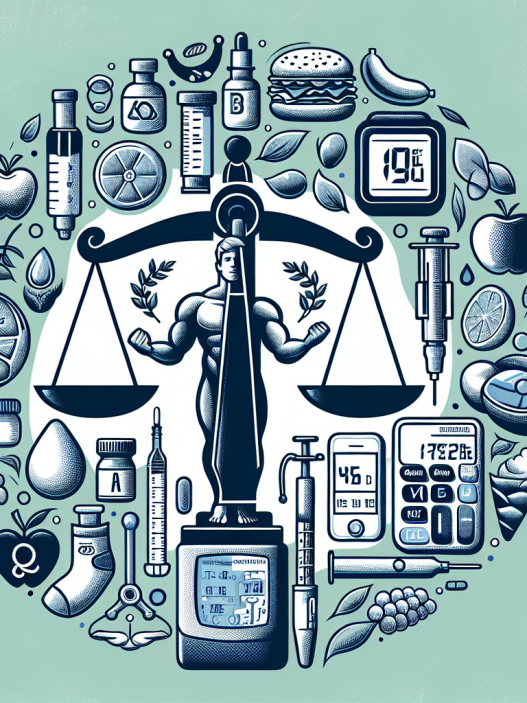[ad_1]
Managing Type 2 diabetes involves more than just medication. One of the most critical factors in maintaining healthy blood glucose levels is effective weight management. This blog post dives deep into the intricate relationship between Type 2 diabetes and weight, offering valuable insights and practical tips for finding the right balance. For those living with diabetes, understanding how weight impacts overall health is essential in rethinking lifestyle choices.
Understanding the Connection Between Type 2 Diabetes and Weight
When discussing Type 2 diabetes, it’s important to recognize how closely intertwined weight and metabolic health are. Excess body weight, particularly fat accumulation around the abdomen, is a significant risk factor for the development and progression of Type 2 diabetes. Adipose tissue acts not only as fat storage but also as an active endocrine organ that can influence insulin sensitivity. Research has shown that even modest weight loss—around 5% to 10% of body weight—can lead to dramatic improvements in insulin sensitivity and overall diabetes management.
Moreover, the pathophysiology behind Type 2 diabetes is complex. When individuals gain weight, the body’s sensitivity to insulin decreases, leading to higher blood glucose levels. This vicious cycle necessitates immediate attention to both weight management and lifestyle modifications. A tailored approach to weight loss, incorporating a combination of dietary changes, physical activity, and behavioral interventions, can dramatically change the trajectory for those diagnosed with Type 2 diabetes.
Effective Dietary Strategies for Weight Management in Type 2 Diabetes
A successful dietary approach for weight management among individuals with Type 2 diabetes focuses on whole, nutrient-rich foods that help regulate blood sugar levels. Here are strategies that can significantly impact one’s health:
-
Carbohydrate Counting: One of the cornerstone strategies in diabetes management is understanding carbohydrate intake. High carbohydrate diets can cause spikes in blood sugar levels, so it’s vital to balance carbs with proteins and healthy fats. This method allows for better blood glucose control while promoting weight loss.
-
Incorporating High-Fiber Foods: Fiber plays a crucial role in managing diabetes and aiding weight loss. High-fiber foods, such as whole grains, fruits, and vegetables, facilitate digestion, promote satiety, and slow sugar absorption into the bloodstream. Aim to include a variety of fruits and vegetables in your meals, and try swapping white bread and pasta for whole grain alternatives.
- Reducing Processed Foods and Sugars: Processed foods and added sugars can contribute to weight gain and poor glycemic control. Cutting back on sugary beverages, snacks, and precooked meals can help lower calorie intake and improve overall health. Instead, focus on preparing meals at home using fresh ingredients, which can make a world of difference in both weight management and diabetes control.
The Role of Physical Activity in Managing Weight and Diabetes
Exercise plays an indispensable role in managing Type 2 diabetes effectively. Regular physical activity not only aids in weight loss but also enhances insulin sensitivity and improves cardiovascular health. Here are several recommendations to incorporate more movement into daily life:
-
Setting Realistic Exercise Goals: It is crucial to set achievable and realistic fitness goals that can easily fit into your lifestyle. The American Diabetes Association recommends a minimum of 150 minutes of moderate-intensity aerobic exercise per week, such as brisk walking. Starting slowly and gradually increasing your activity level can prevent injury and help establish a sustainable routine.
-
Strength Training for Muscular Health: While aerobic exercises are beneficial for cardiovascular health, strength training is equally important in managing blood sugar levels. Building muscle mass improves metabolic health, which assists in weight management. Aim for two to three sessions of strength training per week, targeting all major muscle groups.
- Incorporating Activity into Your Daily Routine: Finding creative ways to include physical activity in your day-to-day life can significantly boost your overall activity level. Simple changes like taking stairs instead of elevators, standing or walking during phone calls, or engaging in gardening can contribute to meeting your exercise goals without feeling like a chore.
Behavioral Modifications for Sustainable Weight Loss
Weight management is not merely a matter of diets and exercises; it requires a holistic approach that encompasses behavioral changes. Here are a few proven behavioral strategies to successfully manage weight while living with Type 2 diabetes:
-
Mindful Eating Practices: Practicing mindfulness during meals involves paying full attention to the experience of eating and drinking. Mindful eating can help with weight loss by slowing down the eating process, allowing your brain to register fullness cues better. This can prevent overeating and promote healthier food choices.
-
Setting Specific Goals: Establishing concrete, measurable goals can augment commitment levels towards weight management. Rather than vague resolutions, try setting specific objectives, like walking a certain number of steps daily or preparing a healthy home-cooked meal three times a week. Tracking progress can also encourage accountability and lead to achieving desired outcomes.
- Building a Support Network: Surrounding oneself with supportive friends, family, or joining a local support group can provide the motivation necessary for lifestyle changes. Sharing experiences, challenges, and milestones with others can make the journey less daunting, bolster emotional well-being, and enhance long-term success.
The Importance of Regular Monitoring and Medical Support
Regular monitoring of blood sugar levels, along with consistent check-ups with healthcare professionals, is essential to managing diabetes. Being proactive about your health can substantially influence weight management and diabetes control positively. Here are a few key elements of effective monitoring and support:
-
Routine Blood Sugar Monitoring: Individuals with Type 2 diabetes should regularly monitor their blood glucose levels to better understand how their body responds to different foods and activities. This knowledge enables better food choices and helps make informed decisions about medication and lifestyle adjustments.
-
Consultation with a Dietitian: A registered dietitian specialized in diabetes management can provide personalized dietary advice that suits individual preferences and circumstances. They can help create a customized meal plan that focuses on achieving weight loss while managing blood sugar levels effectively.
- Collaboration with Healthcare Providers: Maintaining open communication with healthcare professionals allows for a comprehensive approach to diabetes management. Regular evaluations of medications and adjustments, if necessary, ensure that one remains on the best possible treatment plan, ultimately supporting weight management efforts.
In conclusion, managing Type 2 diabetes through effective weight management requires a multifaceted approach that encompasses nutrition, physical activity, behavioral change, and regular medical support. By understanding the close relationship between weight and diabetes, individuals can take actionable steps toward achieving a healthier lifestyle. Implementing the strategies outlined in this blog can pave the path toward better health and improved quality of life for those living with Type 2 diabetes. A commitment to this journey promises not only better management of diabetes but also promotes overall well-being and happiness.
[ad_2]






















